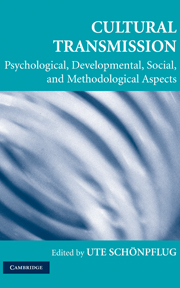Book contents
- Frontmatter
- Contents
- Foreword
- Contributors
- 1 Introduction to Cultural Transmission: Psychological, Developmental, Social, and Methodological Aspects
- 2 Theory and Research in Cultural Transmission: A Short History
- PART ONE EVOLUTIONARY PERSPECTIVE
- PART TWO CROSS-CULTURAL PERSPECTIVE
- PART THREE INTRACULTURAL VARIATIONS
- 14 Intergenerational Transmission of Moral Capital across the Family Life Course
- 15 Similarity of Life Goals in the Family: A Three-Generation Study
- 16 The Intergenerational Transmission of Xenophobia and Rightism in East Germany
- 17 Intergenerational Transmission of Violence
- 18 “Don't Trust Anyone over 25”: Youth Centrism, Intergenerational Transmission of Political Orientations, and Cultural Change
- 19 Value Transmission and Zeitgeist Revisited
- 20 Epilogue: Toward a Model of Cultural Transmission
- Index
- References
19 - Value Transmission and Zeitgeist Revisited
Published online by Cambridge University Press: 05 June 2012
- Frontmatter
- Contents
- Foreword
- Contributors
- 1 Introduction to Cultural Transmission: Psychological, Developmental, Social, and Methodological Aspects
- 2 Theory and Research in Cultural Transmission: A Short History
- PART ONE EVOLUTIONARY PERSPECTIVE
- PART TWO CROSS-CULTURAL PERSPECTIVE
- PART THREE INTRACULTURAL VARIATIONS
- 14 Intergenerational Transmission of Moral Capital across the Family Life Course
- 15 Similarity of Life Goals in the Family: A Three-Generation Study
- 16 The Intergenerational Transmission of Xenophobia and Rightism in East Germany
- 17 Intergenerational Transmission of Violence
- 18 “Don't Trust Anyone over 25”: Youth Centrism, Intergenerational Transmission of Political Orientations, and Cultural Change
- 19 Value Transmission and Zeitgeist Revisited
- 20 Epilogue: Toward a Model of Cultural Transmission
- Index
- References
Summary
INTRODUCTION: ZEITGEIST AND INTRAFAMILIAL TRANSMISSION PROCESSES
In a family, similarity between parent and offspring values can originate from three sources: (1) direct and mediated value-transmission effects of parents' values on the values of their children; (2) processes of adaptation of the parents to values and attitudes of their children; and (3) parents and children being affected similarly by the context within which they live (Boehnke, 2001; Knafo, 2003; Kohn, 1983; Urban & Singelmann, 1998). Intrafamilial processes of value transmission do not take place in an isolated family-only environment but rather in a specific societal context. All members of the family are in permanent contact with this context through peers, mass media, schooling, or work groups. As such, context effects can proceed from the educational system, the socioeconomic situation, or the societal value climate.
There are a growing number of studies dealing with context effects on intergenerational transmission. Urban and Singelmann (1998) define the context implicitly as the amount of variance of the child's values that is not explained by the father's and the mother's values. Other studies deal with context more explicitly. Knafo (2003) analyzes how parents' attitudes – in interplay with the school environment – influence children's values. His findings suggest that a stronger value transmission pertains in high-fit contexts – that is, when parents share the values of the children's school environment. Knafo explains this as follows: A high fit between the educational ideology of parents and the school environment leads to less value conflict within the family.
- Type
- Chapter
- Information
- Cultural TransmissionPsychological, Developmental, Social, and Methodological Aspects, pp. 441 - 459Publisher: Cambridge University PressPrint publication year: 2008
References
- 2
- Cited by

